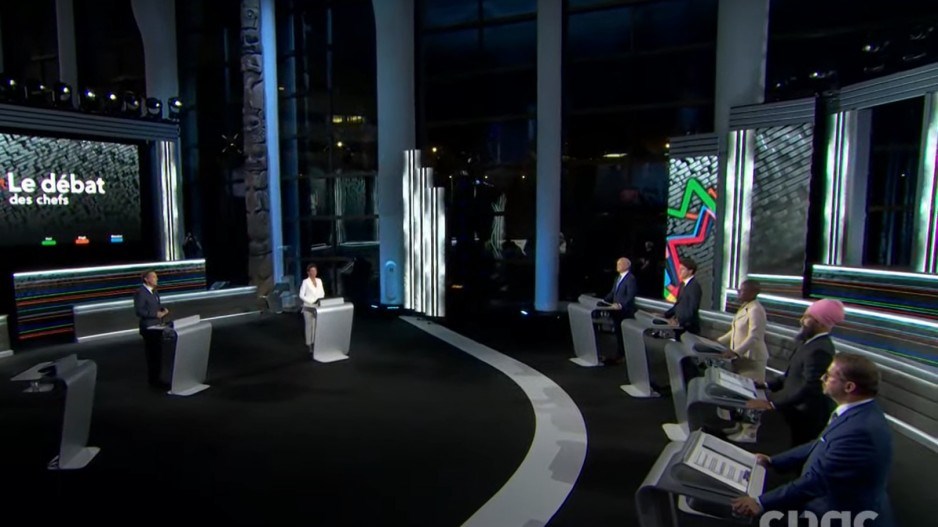The second party leaders’ debate in the 2021 Canadian federal election took place in Gatineau, Quebec – opposite the Ottawa River from the nation’s capital – this evening, with each leader fine-tuning their positions as Sept. 20 approaches.
The debate, in French, was the first to include Green Party chief Annamie Paul, who was not invited to the TVA French debate last week in Montreal. Together with Justin Trudeau (Liberals), Erin O’Toole (Conservatives), Jagmeet Singh (NDP) and Yves-Francois Blanchet (Bloc Quebecois), the five leaders again revisited a wide range of issues from the post COVID economic recovery and environmental thresholds to labour shortages and First Nations reconciliation.
Western Canada was more prevalent in this debate, organized and hosted by a consortium of Canadian media outlets instead of – in the TVA’s case – a single broadcaster. To open the environmental debate, the panel was asked to react to climate change, with the record temperature and deadly wildfire at Lytton in late June/early July cited as the key example.
It is during this topic where Trudeau and O’Toole – battling for the lead in the polls heading into the vote on Sept. 20 – had some of their most heated arguments, with Trudeau calling a vote for the Conservatives a potential return to Stephen-Harper era environmental lapses, while O’Toole fired back at Trudeau for Canada missing its own environmental goals during Trudeau’s six years in office.
Curiously, both leaders came under fire from the other three debate participants for saying it is possible to maintain a path to sustainability while keeping investment in the energy industry. Trudeau noted Ottawa’s decision to buy the Trans Mountain pipeline as a bridge to provide revenue that is necessary to fund the transition, while O’Toole detailed plans such as a carbon account for encouraging the public’s green purchases while leveraging technology like carbon-capture.
“It is not incompatible to be an energy exporter and an environmental leader,” Trudeau said. “... This is why we have put in place an ambitious plan to cap emissions on the oil-and-gas sector to reduce to emissions to net-zero eventually, as well as let Canadians to have to means to buy electric cars. By 2035, all new cars sold in Canada will be electric.”
O’Toole, while attacking Trudeau’s record of keeping pace with goals, was asked how a carbon account that encourages consumption would reduce emissions.
“Canadian deserve a government to delivers its objectives,” O’Toole said, adding the point of the account is to encourage green purchases that will help offset an individual’s carbon footprint.
He added that, unlike the NDP, Greens and the Bloc who oppose the pipeline, continued support for the industry is crucial to the Tories’ economic plan to bring in one million new jobs within one year of being elected.
“Families in the West deserve a chance at a revitalized economy,” O’Toole said.
Wednesday night’s debate also had a heavier component of public interaction, as the party leaders regularly took questions from pre-selected members of the public. One such question, stemming from the recent discovery of unmarked graves at residential schools, asked each leader if they would take an important symbolic step towards reconciliation – by granting First Nations languages official status in Canada.
On that issue, again the three smaller parties’ leaders (Singh, Blanchet and Paul) all pledged to support such a measure. Trudeau and O’Toole, meanwhile, focused on other relations and partnerships with Indigenous communities; Trudeau cited the Liberals’ protecting of such languages in policy and the naming of Inuit public servant Mary Simon as governor general earlier this year, while O’Toole cited an extensive plan of an economic partnership with indigenous businesses to bring economic opportunities.
The discussion, however, got the most heated when it came to the question of Quebec’s identity, when Blanchet accused Trudeau of not acting on Quebecois’ interests when compared to the promises made to the First Nations. The question spurred an unusually emotional response from Trudeau.
“I am Quebecois, Mr. Blanchet,” Trudeau fired back, prompting Blanchet to call for the Liberal leader to relax. “You forget this constantly, that I’m proud to be Quebecois, that I’m always Quebecois and I will always be Quebecois. You [Blanchet] do not have unanimity on Quebec.”
A constant theme of the debate was again the necessity of calling an election during the pandemic, and the debate led off with a question on whether a party chief would commit to holding off on calling snap elections if no one wins a majority. Of of the parties, only Trudeau did not commit to that statement, prompting Singh to repeatedly return to the issue during other points of the debate.
The leaders also took fundamentally different approaches to plans for the budget – including on programs such as the CREB emergency benefits program.
Both O’Toole and Trudeau said the reduction is coming as companies and people return to normalcy, but that was met by opposition by Paul, who asked other leaders to visit her riding of Toronto-Centre to see whether the CREB should continue.
“People are being threatened with evictions,” Paul said, noting this may be the time to consider a guaranteed minimum income policy. “There are gaps in the system.”
Singh, meanwhile, mainly stuck to his points of differentiating his party from the Liberals as a viable alternative. When asked about the NDP’s plan to spend much more than the Liberals have – even with the current growing deficit – Singh maintained that he will tax the wealthy and large corporations, especially tech companies from the United States who are profiting in the Canadian market.
“If you have a business in Canada, you should pay your fair share - and they are not,” he said, adding that the NDP will look at everything from estate taxes to revenue taxes and closing other loopholes to help even the budget.
The English-language debate is scheduled for Thursday evening.




